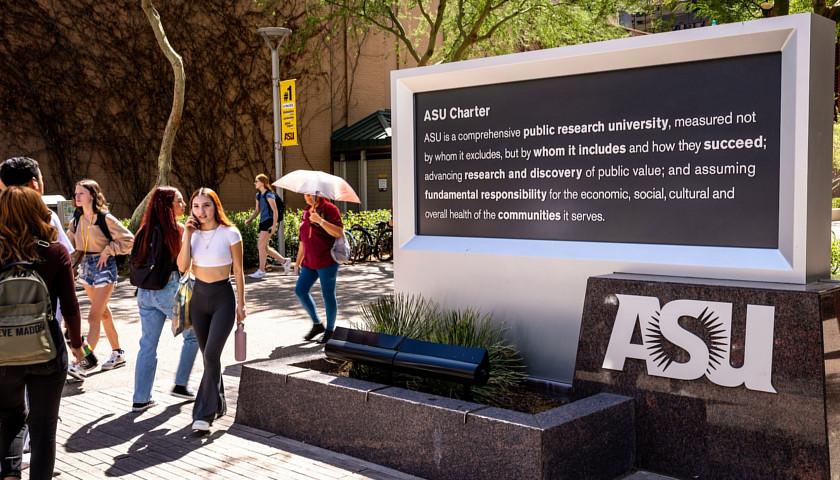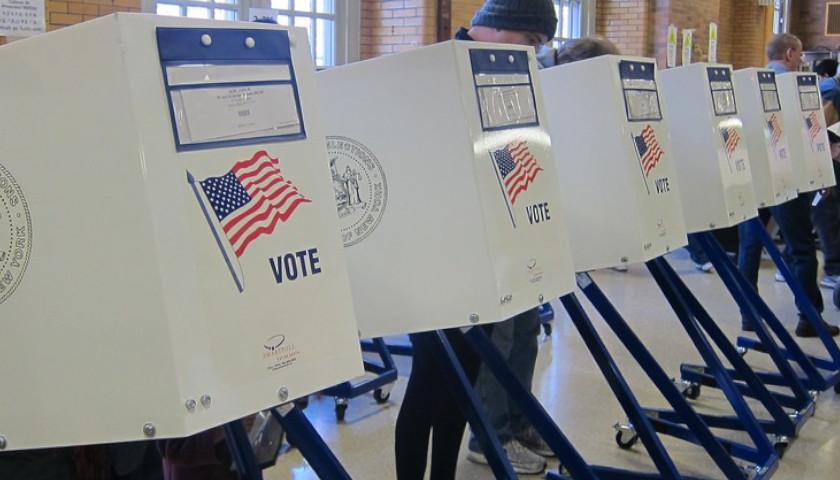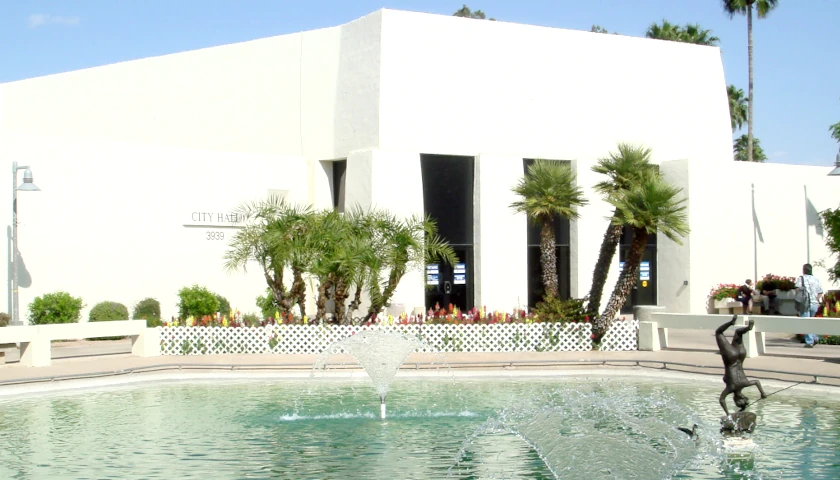by Greg Piper
Arizona State University is not only violating state law by training employees in diversity, equity and inclusion doctrines that rely on “blame and judgment,” the school’s also hiding materials related to that training and a mandatory DEI course for journalism students, according to a state watchdog.
The Goldwater Institute brought its concerns to the ASU Board of Regents and the Grand Canyon State’s taxpayers Tuesday after several months of haggling with school lawyers for copies of “narrow, specific, and reasonably described” public records, staff attorney Stacy Skankey wrote in a letter to regent board Chairman Fred DuVal.
“They are within the ASU’s possession and should be readily available for immediate production,” yet the taxpayer-funded university continues to flout state law requiring such records be turned over “promptly,” Skankey wrote.
The watchdog published email chains that show ASU subverting the instruction provided by the Cronkite School of Journalism, named after venerable CBS anchor Walter Cronkite and deemed by the Broadcast Education Association the best in the country for overall programs.
When the ASU “records custodian” apparently ignored the requests and Goldwater went up the ladder, the university’s in-house lawyers invoked a controversial exception that journalism students learn how to battle when filing public records requests.
The materials ASU did turn over show that its publicly funded and mandatory “Inclusive Communities” employee training repeatedly traffics in blame and judgment “on the basis of race, ethnicity or sex” in violation of state law, Skankey told DuVal in another letter Tuesday.
Among their content: explanations of “white fragility” and “white privilege,” the racism in “seemingly innocuous questions” such as where a nonwhite person is from, the privilege of “largely unquestioned” heterosexuality, and getting comfortable with being called a white supremacist by moving whiteness from “culturally neutral” to a “critical space.”
This goes far beyond teaching employees that “such ideas exist” but rather officially “promulgate[s] these messages” in non-optional settings, Skankey told the chairman. If the regents don’t order ASU to “immediately cease and desist” from using taxpayer money on this training or mandating it, and ASU keeps doing it, the board will face “potential litigation.”
“It’s bad enough that ASU required the vast majority of faculty job applicants to pledge allegiance to progressivism by submitting a mandatory ‘diversity’ statement,” Skankey said in a press release Wednesday. “Now the campus thought police want to extend their tentacles into faculty training, too.”
The Arizona Board of Regents eliminated the diversity statement in August after another campaign by the institute, which found that 80% of faculty jobs at board-overseen ASU, the University of Arizona and Northern Arizona University required the statement.
ASU also faced scrutiny from the Legislature in July for its decision to shutter a campus think tank after the namesake of its T.W. Lewis Center for Personal Development yanked his share of its funding to protest the “alarming and outright hostility” of faculty and administrators to its February event with conservative pundits Dennis Prager and Charlie Kirk.
Goldwater filed requests for the employee training materials and the journalism school’s “Diversity and Civility at Cronkite” course syllabus in early March. Getting no response for a month, the institute demanded compliance from ASU’s Office of General Counsel, according to Skankey’s public records letter.
Vice President for Legal Affairs Kimberly Demarchi responded that “technology and access restrictions” made it difficult to provide the “slides, questions, answers, and other training and test materials” for employees and records that define a “correct” answer.
She repeatedly missed her own deadlines to provide updates, and when Goldwater finally got a production in late July, it was missing the “test materials” and “correct” answer guides, and Demarchi has yet to answer when they will be provided, the letter states.
Demarchi claimed ASU had no policy or procedures for situations in which employees fail to take or pass the training, and that it had not taken any such disciplinary action, the correspondence shows.
The watchdog claims employees who guess wrong will be “reported to their supervising dean.”
Regarding the Cronkite School DEI course, which is required for graduation, Demarchi refused to send a copy of the syllabi because of copyright, telling the institute it would have to visit campus to inspect the materials and “take notes” but not copy them in any way.
ASU told me they couldn’t send course syllabi via email because they were “trade secrets in that they are copyright-protected materials” pic.twitter.com/n9ofgNJ6zW
— Neetu Arnold (@neetu_arnold) February 26, 2023
Other public universities have invoked copyright to hide academic materials from the public, with few conclusive legal rulings.
Transparency advocates fumed when state courts approved the University of Missouri’s refusal to share syllabi with the National Council on Teacher Quality in 2014. The University of California Santa Barbara withheld a religion course syllabus from a Hindu activist seeking its portrayal of the goddess Kali in 2018.
More recently North Carolina State rejected a think tank’s request for education syllabi. Martin Center for Academic Renewal President Jenna Robinson argued syllabi should be publicly available under fair use and praised Texas for its law mandating its public universities post syllabi online.
After inspecting the DEI course syllabi in person, Goldwater filed a supplemental request again seeking copies of both the syllabi and now the linked documents in the “assignments” pages. Demarchi didn’t respond to an update request before Goldwater received an automated response Aug. 15 that the request was “closed,” the letter says.
Demarchi responded to a second request Aug. 18, claiming the closure was an accident likely caused by “staff vacancies and changes in this area of our office’s operations” and promising to turn over copies “next week at the latest.” That never happened, the watchdog told DuVal.
The regents should expect a second lawsuit if ASU does not “immediately” produce the outstanding records or provide an update on the status of production, Skankey warned.
“The Cronkite School is supposed to be one of the country’s preeminent training grounds for journalists; instead it’s forcing cultural and political indoctrination down students’ throats,” the institute said Wednesday.
Just the News sent queries to ASU, DuVal and OGC for their responses to Goldwater’s allegations, and to Cronkite School Dean Battinto Batts and Executive Director of Strategic Initiatives Malcolm Holmes, who oversees DEI, for their response to Demarchi’s invocation of copyright to hide Cronkite syllabi.
ASU Media Relations Director Veronica Sanchez pointed Just the News to OGC’s written procedures.
She said OGC “handles a number of issues for ASU, public records requests included,” and response timing depends on “the complexity and breadth of the request and can range from days to weeks, sometimes even months.”
– – –
Greg Piper is an investigative reporter with Just the News. He previously covered higher education at The College Fix and technology policy for Warren Communications News in Washington, D.C., and served as guest host on C-SPAN’s The Communicators.
Photo “ASU Charter Monument” by Arizona State Univesity.





